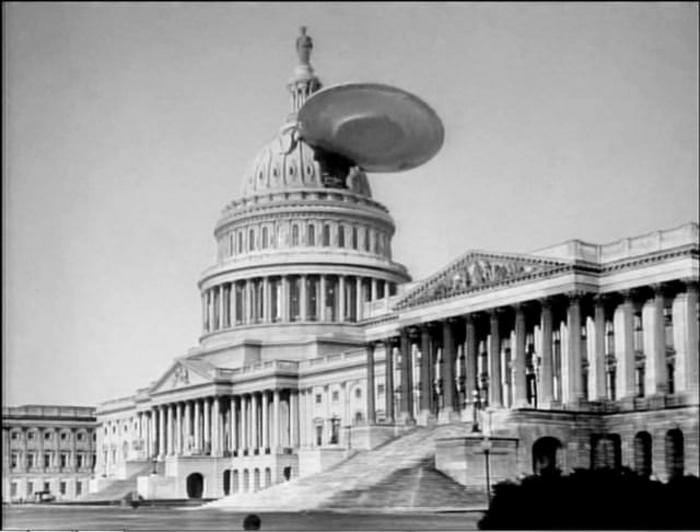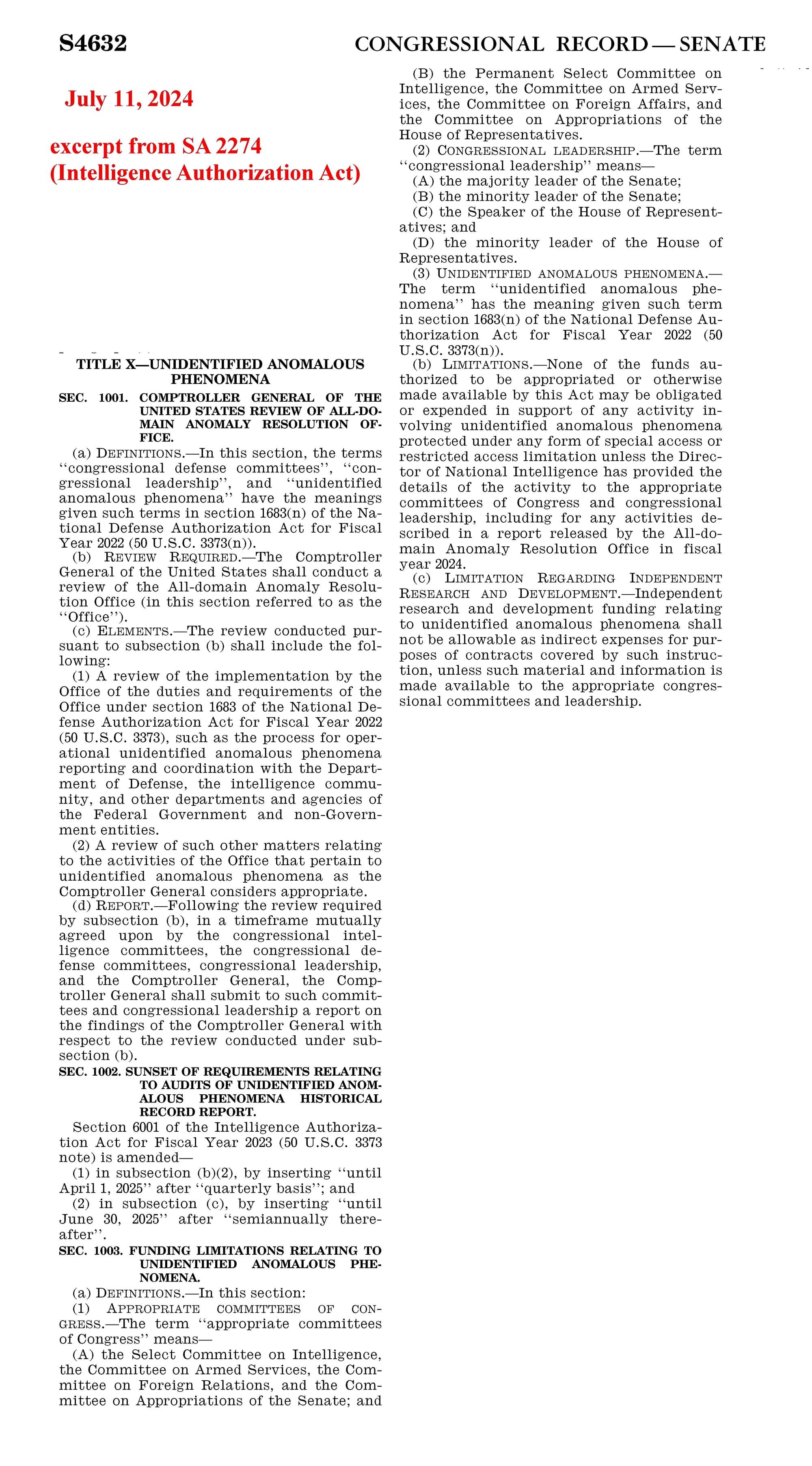編者注:UAPの情報公開を求める法案については非常に厳しいものがある。ペンタゴンの態度は80年来変化は微小で情報隠ぺい・偽情報に徹している。また、根本には国家安全保障会議を操る影の”UFO墜落回収・リバースエンジニアリング”特別委員会の存在が見えている。
●ラウンズ上院議員とシューマー上院議員、NDAAの修正案としてUAP情報公開法を提出
UAP情報公開法が連邦議会議事堂に戻る
By Douglas Dean Johnson
2024年7月13日土曜日、
マイク・ラウンズ上院議員(共和党)は、チャック・シューマー上院院内総務(民主党)を筆頭共同提案者として、未確認異常現象公開法(UAPDA)を提出した。
米上院の情報・軍事両委員会のメンバーであるラウンズ上院議員は、2024年7月11日、2025会計年度国防権限法(NDAA、S.4638)の議場修正案(SA2610)としてUAPDAの条文を提出した。
新ラウンズ-シューマーUAP開示法の本文は、7月13日にオンラインに掲載された議会記録の2024年7月11日版のS4943-4950ページに掲載されている。ラウンズ-シューマー修正案の全文をPDFファイルで以下に掲載する。
ラウンズ-シューマーUAPDA (SA2610) 7-11-24
ラウンズ-シューマーUAPDA (SA2610) 7-11-24.pdf
271 KB
提出されたラウンズ-シューマー間の文言を精査する機会はまだないが、2023年7月27日に上院を通過した24年度NDAAに盛り込まれたシューマー-ラウンズ間のUAPDAをほぼ踏襲しているように見える。UAPDAの2023年バージョンは、その後下院との協議交渉で、主に国防総省の反対により削られた。(国立公文書記録管理局(National Archives and Records Administration)に特定のUAP関連記録の収集を義務付けるという、かなり狭い条項が制定された)。
ラウンズ-シューマー新議案は、大統領任命の上院確認済み未確認異常現象記録審査委員会(召喚と資産収用権限を含む広範な権限を持つ一時的な連邦機関)の設立を規定する物議を醸す条項を残している。
また、"非人間的知性"、"起源不明の技術"、"未確認の異常現象"、"レガシープログラム "といった重要な活動用語の定義も、眉唾ものである。
次に何が起こるのか?
シューマー上院院内総務は、上院本会議でNDAAがいつ審議されるかをまだ発表していない。
これまでのところ、800以上の修正案が提出されている。
上院の規則では、各議員はNDAAのような承認法案に対して、単独で議場修正案をいくつでも提出する理論的権利を持ち、おそらくそれぞれについて点呼投票を強制することができるが、実際には多くの制約がある。
NDAAの管理者は、両党とも、この法案を広範な議場修正手続きにかけることを好まないだろう。政治的に険悪になり、議場での審議に何日も費やすことになりかねないからだ。そのうえ、どの上院議員も修正案に対して60票のハードルを設ける権限を持っている。そのため毎年、NDAAの修正条項の数や主題を制限するための協定が交渉される。こうした交渉のほとんどは、人目に触れないところで行われる。
ラウンズ-シューマー修正案が今年、上院で最終的に可決されるかどうかについては、予断を許さない。
注目すべきは、2023年にはシューマー院内総務がこの修正案の筆頭提案者であったが、現在はその重要な役割を、非常に有能な上院議員でありながら上院の少数党に属するラウンズ上院議員が担っていることである。
しかし私は、UAPDAが今年上院を通過した 場合、まず何らかの広範なパッケージ取引(例えば、複数科目の「マネージャー修正案」の一部として、あるいは「代用修正案」と呼ばれる法案全体の書き換えの一部として)を通じてNDAAの一部となる必要があると予測する。
これは、上院議場での討論や 点呼投票ではなく、舞台裏での交渉を通じて行われる。
私がここで述べていることは、多様なテーマに関する他の多くの修正案も解決される方法である。
おそらく、上院の議場で個別の点呼投票が行われるのは、NDAAのごく少数のテーマ別修正案だけだろう。
UAP 関連条項がそのような採決を受けることになるとは、非常に驚きである。 今まで、UFO 関連の修正案が 、上下 両院の議場で、個別の課題別点呼採決の対象となったことはない。
仮にUAPDA(あるいはそこから派生したもの)がNDAAの一部として上院を通過したとしても、そのような文言は下院との会議委員会での交渉に直面することになる。
NDAAの下院通過版(H.R.8070)には、UAP関連の条項は含まれていない。また、2023年以降、UAPDAに対する国防総省の否定的な姿勢が軟化したという証拠も見たことがない。
情報認可法
すべての年ではないが、多くの年において、情報権限法(IAA)は立法過程のある段階で国防権限法(NDAA)と統合される。この場合、米下院と上院の最終投票はNDAAとIAAを統合したものに行われ、2つの法案は1つの法案として大統領に送られる。
上院情報特別委員会(SSCI)の委員長であるマーク・ワーナー上院議員(民主党)は7月11日、NDAA(S.4638)の修正案(SA.2274)として、25年度情報認可法(IAA、S.4443)の本文を提出した。
SSCIで承認された通り、IAAにはいくつかのUAP関連条項が含まれており、これについては2024年6月24日にX/Twitterに投稿した長文の中で紹介した。
UFO CONGRESSIONAL NEWS: SENATE INTELLIGENCE COMMITTEE ISSUES REPORT ON FY 2025 INTELLIGENCE AUTHORIZATION ACT
— D. Dean Johnson (@ddeanjohnson) June 24, 2024
On June 3, 2024, I reported on the UAP-related provisions of the Fiscal Year 2025 Intelligence Authorization Act (IAA) (S. 4443) that had been approved by the U.S.… pic.twitter.com/70e73XgbT1
ワーナー上院議員がSA2274として提出した情報権限法のこれらのUAP関連条項の本文は、2024年7月11日付議会記録のS4632ページから転載したものである。
●Senators Rounds and Schumer submit UAP Disclosure Act as possible amendment to NDAA

By Douglas Dean Johnson
@ddeanjohnson on X/Twitter // my gmail address is my full name
Initially posted Saturday, July 13, 2024, 2:45 PM EDT.
Senator Mike Rounds (R-SD) has introduced a version of the Unidentified Anomalous Phenomena Disclosure Act (UAPDA), with Senate Majority Leader Chuck Schumer (D-NY) as lead co-sponsor.
Senator Rounds, who is a member of both the Intelligence and Armed Services committees in the U.S. Senate, on July 11, 2024 submitted the UAPDA text as a possible floor amendment (SA 2610) to the Fiscal Year 2025 National Defense Authorization Act (NDAA, S. 4638). The text of the new Rounds-Schumer UAP Disclosure Act appears on pages S4943-4950 of the July 11, 2024 edition of the Congressional Record, which was posted on line on July 13. The entire text of the Rounds-Schumer amendment is embedded below as a PDF file.
Rounds-Schumer UAPDA (SA2610) 7-11-24
Rounds-Schumer UAPDA (SA2610) 7-11-24.pdf
271 KB
While I have not yet had the opportunity to thoroughly review the Rounds-Schumer language as submitted, it appears to largely track the Schumer-Rounds UAPDA that was incorporated into the FY24 NDAA that passed the Senate on July 27, 2023. The 2023 version of the UAPDA was later gutted in conference negotiations with the House of Representatives, due mostly to opposition from the Pentagon. (A much narrower provision requiring the National Archives and Records Administration to collect certain UAP-related records was enacted.) The new Rounds-Schumer proposal retains controversial provisions providing for creation of a presidentially appointed, Senate-confirmed Unidentified Anomalous Phenomena Records Review Board-- a temporary federal agency with broad powers, including subpoena and eminent domain authorities. It also retains eyebrow-raising definitions for such key operative terms as "non-human intelligence," "technologies of unknown origin," "unidentified anomalous phenomena," and "legacy program."
WHAT HAPPENS NEXT?
Senate Majority Leader Schumer has not yet announced when the full Senate will take up NDAA. So far, over 800 possible floor amendments have been filed. Under Senate rules, each senator has the theoretical right to offer any number of freestanding floor amendments to an authorization bill such as NDAA, and perhaps to force roll call votes on each – but in practice, there are many constraints. The managers of the NDAA, of both parties, would not be disposed to subject the bill to a wide-open floor amendment process, which would be politically fraught and could consume many days of floor time. Moreover, any senator has the power to create a 60-vote hurdle for any amendment. Thus, each year agreements are negotiated to limit the number and subject matter of amendments to the NDAA. Most of these negotiations occur out of public view.
I make no predictions as to the prospects for ultimate Senate passage of the Rounds-Schumer amendment this year. It is noteworthy that in 2023, Majority Leader Schumer was the lead sponsor of the measure, but that key role has now been assumed by Senator Rounds, who is a very capable senator but a member of the minority party in the Senate. However, I will predict that if the UAPDA does clear the Senate this year, the UAPDA must first become part of the NDAA through some broader package deal (e.g., as part of a multi-subject "manager's amendment," or within a bill-wide write over called a "substitute amendment"). That would occur through a process of behind-the-scenes negotiations, not by floor debate and a roll call vote on the Senate floor.
What I am describing here is also the way in which many other amendments on diverse subjects will also be resolved. Most likely, only a small number of subject-specific amendments to NDAA will receive separate roll call votes on the Senate floor, and I would be very surprised to see any UAP-related provision receive such a vote. No UFO-related amendment has ever been the subject of a separate, issue-specific roll call vote on the floor of either house of Congress.
Even if the UAPDA (or something derived from it) does clear the Senate as part of NDAA, such language would still face conference committee negotiations with the House of Representatives. The House-passed version of NDAA (H.R. 8070) contains no UAP-related provisions. Nor have I seen any evidence that the Pentagon's negative posture towards the UAPDA has softened since 2023.
INTELLIGENCE AUTHORIZATION ACT
In many years, but not all, the Intelligence Authorization Act (IAA) is merged with the National Defense Authorization Act (NDAA) at a some stage in the legislative process. When this is done, the final votes in the U.S. House of Representatives and the U.S. Senate are on a merged NDAA-IAA, and the two measures are sent to the President as a single bill.
Apparently seeking to follow this path again this year, Senator Mark Warner (D-VA), chairman of the Senate Select Committee on Intelligence (SSCI), on July 11 filed the text of the FY25 Intelligence Authorization Act (IAA, S. 4443) as a proposed amendment (SA 2274) to NDAA (S. 4638). As approved by the SSCI, the IAA contains several UAP-related provisions, which I described in a long post on X/Twitter on June 24, 2024, found at the link below.
The text of those UAP-related sections of the Intelligence Authorization Act, as submitted by Senator Warner as SA 2274, appear below, reproduced from page S4632 of the July 11, 2024 Congressional Record.






